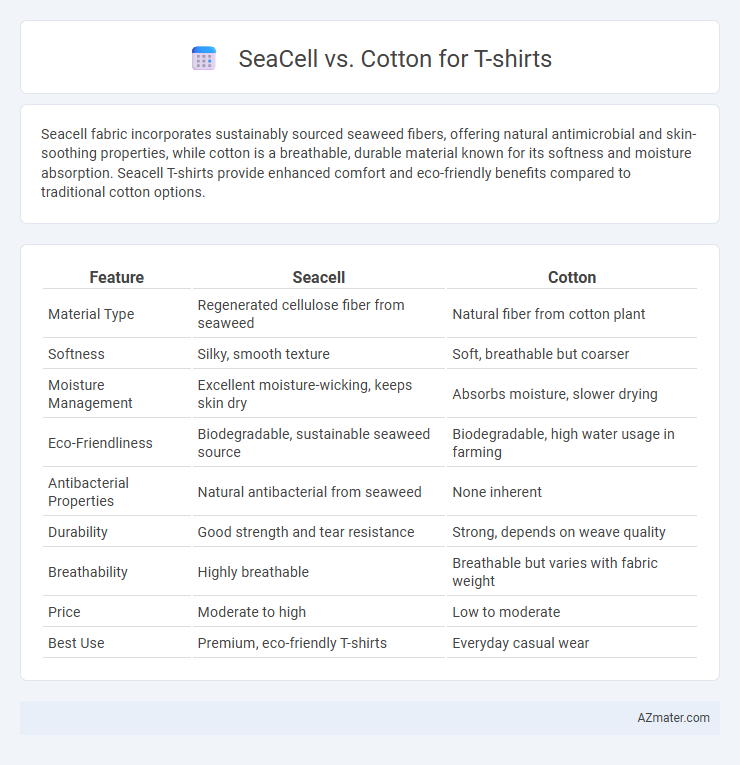Seacell fabric incorporates sustainably sourced seaweed fibers, offering natural antimicrobial and skin-soothing properties, while cotton is a breathable, durable material known for its softness and moisture absorption. Seacell T-shirts provide enhanced comfort and eco-friendly benefits compared to traditional cotton options.
Table of Comparison
| Feature | Seacell | Cotton |
|---|---|---|
| Material Type | Regenerated cellulose fiber from seaweed | Natural fiber from cotton plant |
| Softness | Silky, smooth texture | Soft, breathable but coarser |
| Moisture Management | Excellent moisture-wicking, keeps skin dry | Absorbs moisture, slower drying |
| Eco-Friendliness | Biodegradable, sustainable seaweed source | Biodegradable, high water usage in farming |
| Antibacterial Properties | Natural antibacterial from seaweed | None inherent |
| Durability | Good strength and tear resistance | Strong, depends on weave quality |
| Breathability | Highly breathable | Breathable but varies with fabric weight |
| Price | Moderate to high | Low to moderate |
| Best Use | Premium, eco-friendly T-shirts | Everyday casual wear |
Introduction: Seacell vs Cotton for T-Shirts
Seacell fabric, derived from seaweed and cellulose fibers, offers natural moisture-wicking and antibacterial properties that enhance comfort in T-shirts compared to traditional cotton. Cotton, known for its breathability and softness, remains a popular choice due to its durability and ease of care. Choosing between Seacell and cotton depends on desired fabric benefits such as sustainability, skin sensitivity, and performance in moisture management.
What is Seacell Fabric?
Seacell fabric is an innovative textile made from seaweed fibers blended with natural cellulose, offering eco-friendly and biodegradable properties. Unlike traditional cotton, Seacell is known for its skin-soothing benefits and enhanced moisture management, making it ideal for sensitive skin and activewear. Its unique composition provides natural antioxidant effects, distinguishing Seacell t-shirts from conventional cotton garments in comfort and sustainability.
Understanding Cotton Material
Cotton, a natural fiber derived from the cotton plant, offers breathability, softness, and moisture absorption, making it a popular choice for t-shirts. Its fibers are biodegradable and hypoallergenic, providing comfort and sustainability in apparel. Compared to Seacell, which integrates seaweed fibers for added skin benefits, cotton maintains superior durability and ease of care in everyday wear.
Sustainability: Seacell vs Cotton
Seacell fabric, derived from sustainably harvested seaweed combined with organic cotton, offers superior environmental benefits compared to conventional cotton, which involves high water consumption and pesticide use during cultivation. The renewable nature of seaweed and minimal processing requirements reduce carbon footprint, making Seacell a more eco-friendly alternative. Cotton's traditional farming methods contribute to soil degradation and resource depletion, while Seacell supports biodiversity and reduces reliance on synthetic materials.
Comfort and Breathability Comparison
Seacell fabric, infused with seaweed fibers, offers superior moisture-wicking properties and natural antibacterial benefits, enhancing comfort and breathability compared to traditional cotton. Cotton is renowned for its softness and breathability but tends to retain moisture, which can reduce comfort during extended wear. The bioactive components in Seacell contribute to a cooler, drier feel, making it ideal for active or sensitive skin wearers seeking enhanced comfort.
Skin Benefits: Seacell vs Cotton
Seacell fabric, infused with seaweed, offers enhanced skin benefits such as improved moisture retention, anti-inflammatory properties, and antioxidant effects that help soothe sensitive skin and promote skin health. Cotton, while breathable and soft, lacks these bioactive compounds, primarily providing basic comfort and hypoallergenic qualities. Choosing Seacell over cotton for T-shirts can result in better skin hydration and protection, especially for individuals with dry or irritated skin.
Durability and Longevity
Seacell fabric, infused with seaweed fibers, offers enhanced durability and resistance to wear compared to traditional cotton T-shirts. Cotton tends to weaken and fade after repeated washing, while Seacell maintains fiber strength and color vibrancy over time. The incorporation of natural bioactive compounds in Seacell fabric contributes to its longevity, making it a superior choice for long-lasting apparel.
Moisture Management and Odor Control
Seacell fiber in T-shirts offers superior moisture management by efficiently wicking sweat away from the skin and promoting quick evaporation, enhancing comfort during physical activities. Its natural seaweed components provide inherent antimicrobial properties that reduce odor-causing bacteria, maintaining freshness over extended wear. In contrast, traditional cotton absorbs moisture but dries slowly, often trapping sweat and leading to increased odor and discomfort.
Environmental Impact and Biodegradability
Seacell fabric, derived from seaweed and cellulose fibers, offers significant environmental benefits with its renewable raw materials and low-impact production process compared to conventional cotton. Cotton cultivation requires substantial water, pesticides, and land, contributing to soil degradation and pollution, whereas Seacell production minimizes resource usage and chemical inputs. Both Seacell and cotton are biodegradable, but Seacell's marine biomass origins enhance its breakdown efficiency in natural environments, reducing long-term textile waste.
Final Verdict: Which is Best for T-Shirts?
Seacell T-shirts outperform cotton in moisture-wicking, anti-bacterial properties, and environmental sustainability due to their seaweed-infused fibers enhancing skin benefits. Cotton remains popular for breathability, softness, and affordability but lacks Seacell's unique bioactive qualities that improve skin health and odor control. For high-performance, eco-friendly, and skin-nurturing T-shirts, Seacell is the superior choice over traditional cotton.

Infographic: Seacell vs Cotton for T-shirt
 azmater.com
azmater.com